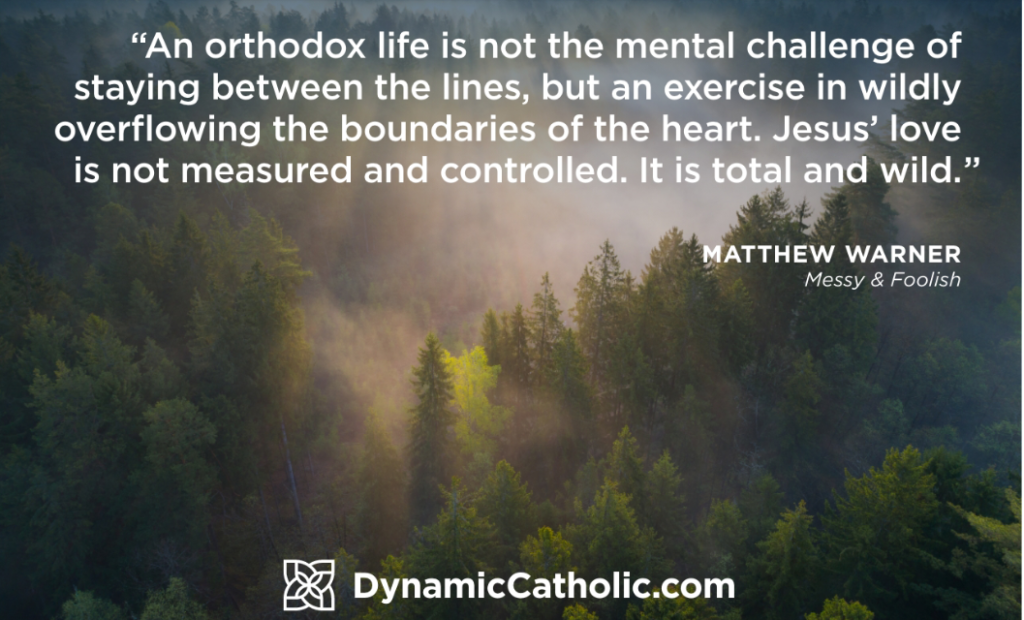
Click on link:
//All Things Catholic//

416 N 2nd St, Albemarle, NC, 28001 | (704) 982-2910

Click on link:
//All Things Catholic//

“God Loves Them More Than You Do”
Father Peter Fitzgibbons
September 10 – 11, 2022
Gospel: Luke 15: 1-32
The other day I was making my rounds at the VA hospital, and one of the nurses told me that there was a new addition to Hospice. I said “Okay” and I went in to the patient’s room. He didn’t look good at all and won’t make it through the weekend Although they gave him two years in the original diagnosis, his doctors helped him get six years beyond that. He got eight years when he was supposed to have two. That shows you how well medicine works. But now he was on his way to see the Savior. I was talking to his wife and his sister-in-law was also there. Very nice and sweet people. I told them that I needed to ask them some questions because I have to do a Chaplain’s Spiritual Assessment for every patient who comes in. Mostly, it’s creative writing on my part. One of the questions is “Do you have any end-of-life issues?” So how long have you had this chaplain gig? End-of-life issue means end of life. Yeah, I’ve got a real issue with that! Are you crazy? But they want something in the file, so I create a narrative of what’s happening with the patient to make the hospital happy. If they don’t see it, they get a little antsy. So, I asked his wife if he had any particular religion. She said no. Did he go to church when he was able?” No. He was a very interesting man, and I wish I had met him before he became so ill. I may have crossed paths with him in the first Gulf War. His job was explosive ordinance disposal and he disassembled mines and bombs. He wasn’t exactly the nervous type before that – maybe afterward – but not before. He was pretty good at his job because he survived it. And he was blessed because he got a disease – none of us know when we will contract one – and he lived well beyond the original diagnosis. You never know. I told him and his family that I would come back to visit on my afternoon rounds. So, I continued my rounds, visiting other patients. I ran into the nurse practitioner for Hospice, and she asked me if I had seen the new Hospice patient and given him Last Rites. I said, “No, he’s not Catholic. His wife said he is Christian.” She said, “Well, according to our records, he’s Catholic.” Okay. So, after lunch I went on my afternoon rounds, and the wife and sister-in-law were not in the room. I looked around to make sure the coast was clear and gave the man the Last Rites. And just as I was finishing, his wife and sister-in-law walked in. Whew! I snuck that one in! I accomplished the mission. . .by any means necessary. I told the nurse manager what I did, but it was never written down because we didn’t want to cause any more problems. I’m a real certified weasel, but I’m a weasel for Christ.
This is how much God loves us. I have people come up to me all the time, and rightly so, asking for prayers for family members, loved one, needs, worries, fears, and all sorts of troubles we are prone to. I’m happy to pray for them, but I try to tell them, if I remember, that no matter how much you love this person, God loves him or her much more. That’s why God created them in His image and likeness. That’s why He suffered and died for them. That’s why He is constantly running after them to beg them to embrace Him and His love. God never gives up. Read the “Hounds of Heaven,” a poem by Francis Thompson. God is always running after us, so much is His great love, that even at the moment of death if we say we are sorry for our sins just because we are afraid of dying and the eternal fires of hell and not because we are particularly sorry for them, God forgives us. That is sufficient and God will forgive us. Remember the 6th prayer from the Cross: “Father, forgive them for they know not what they do.” One of the greatest experiences of God’s love is His mercy.
Saint John Vianney, known as the Curé d’Ars, is the patron saint for parish priests. God’s gift to him was that he could read souls. One day, he was walking along a road in France in an area where his parish was located. A woman approached him and said, “Curé, you know my husband died.” Father Vianney said, “Yes.” The woman said, “He fell off a bridge and drowned. He’s in hell, isn’t he?” Saint Vianney said, “I don’t know.” The woman yelled, “You can read souls! Why don’t you know? He beat me, he drank, he gambled. . .“ She had a whole laundry list of how bad her husband had been. “So, he’s in hell, isn’t he?” Saint Vianney replied, “I don’t know. There’s a long time from when he left the bridge and when he hit the water.”
Even in that short span of time, he could have said, “I’m sorry,” and that would have been sufficient. Perfect contrition is if you say “I’m sorry” because you love God. Imperfect contrition is if you said it because you don’t want to go to hell. Even so, that is sufficient to receive God’s forgiveness. So much does He love us. He sees all our trials, worries, and concerns about those who are near and dear to us. But remember, God loves them more than you do, and He will never, ever give up on them as long as they have a breath in them.
Father’s Afterthoughts. . .
My day is never dull. There is always something interesting going on here. Today, I had a wedding, and the bride came up in a carriage drawn by horses. I got to pet the horses. I love horses! I’m still six years old. Quoting Sir Winston Churchill, Doctor Eddins, a local physician, said, “There is something about the outside of a horse that is good for the inside of a man.”
How will you apply this message to your life? ________________________________________
________________________________________________________________________________
You can read all of Father Fitzgibbons’ sermons by going to annunciationcatholicalbemarle.com and clicking on “Blog” then “Categories” then “Sermon Notes.” On a cell phone: click on “Blog” then “Menu” and then “Categories”

//Contemplative Monk//


Love changes the way we know things. Love is not blind affection or mere satisfaction. Rather, love is the highest good that seeks and desires the highest good in another. To love is to know the good in another without questioning the good of the other or trying to understand the good of the other. The wise person is one whose knowledge is shaped by love and who sees the world through the eyes of love. Such a person lives from a deeper center within. Rooted in the heart, the wise person is rooted in the world and sees the world in its truth and beauty.
One sees from the center of the beloved; thus one sees the world unafraid of the vision. The wise person is one who has the freedom to remain empty in the face of encounter and to allow the experience of encountering the new, whether a new person, creature or idea, to enter one’s life and change one’s capacity to love.
—from the book Compassion: Living in the Spirit of St. Francis
by Ilia Delio, OSF



“It Depends”
Father Peter Fitzgibbons
August 20 – 21, 2022
Gospel: Luke 13:22-30
22 Through towns and villages He went teaching, making His way to Jerusalem. 23 Someone said to Him, ‘Sir, will there be only a few saved?’ He said to them, 24 ‘Try your hardest to enter by the narrow door, because, I tell you, many will try to enter and will not succeed. 25 ‘Once the master of the house has got up and locked the door, you may find yourself standing outside knocking on the door, saying, “Lord, open to us,” but He will answer, “I do not know where you come from.” 26 Then you will start saying, “We once ate and drank in your company; you taught in our streets,” 27 but He will reply, “I do not know where you come from; away from Me, all evil doers!” 28 ‘Then there will be weeping and grinding of teeth, when you see Abraham and Isaac and Jacob and all the prophets in the Kingdom of God, and yourselves thrown out. 29 And people from east and west, from north and south, will come and sit down at the feast in the Kingdom of God. 30 ‘Look, there are those now last who will be first, and those now first who will be last.’
Let me ask you a theological question. Is it hard to enter the Kingdom of God? The best answer is “it depends.” And I don’t mean old people’s garments. It depends on the condition of your soul. The condition of your soul depends on who you love more. Do you love God or do you love you? There is a saying in counseling: “I’m not much but I’m all I think about.” God will ask, “Do you love me?” It’s a requirement to get into Heaven. And it’s not the emotional, frothy “Oh I love you!” kind of love. There are people in the “Nut Hut” who do that, and they aren’t quite well. To love God is to do the works of God. What are the works of God? They are works of love. Our Lord said, “If you love me keep My Commandments.” That is His commandment. It is also the commandment of the Church as Paul found out in the Book of Acts. You cannot separate the two. Some ecclesiastical jailhouse lawyers might say, “Well, I love Christ but not the Church.” You cannot do that. It’s contrary to scripture from the very earliest time in 34 ad. Christ died in 33 ad.
So, how do we see the Commandments? Our Lord said, “If you love Me keep My Commandments. My Commandments are not burdensome.” It’s how much you love. If you love, there is no act that is burdensome. Saint Augustine said, “There is no labor involved in works of love and if so, even the labor itself is love.” Love becomes burdensome when we focus on ourselves. We want what we want when we want it. Spiritually, we call that “king baby.” “I want what I want and if I don’t get it, I won’t come to church.” Shut up. God help us.
Every time our Lord asked the apostles a question, guess what happened. They got it wrong. How can we love? It’s not hard. I saw it as a soldier all the time. If some schmuck got hurt for whatever reason, other soldiers would go over and help the injured soldier. They didn’t expect thanks for carrying the soldier’s stuff. They didn’t even ask…they just did. They helped take care of business. At Christmas time, young soldiers who got married and had three or four kids right away needed money for gifts for their kids. We had various funds that could help, but my sergeant-major said, “No. We take care of our own. We don’t go to strangers.” So, everybody donated money, and we made sure that all those children had a good Christmas. There was this one child who had leukemia and was being treated at an Air Force base. His father wanted to see him, but it was expensive to travel. So, the colonel came up with a “training mission.” They put the father on a bird and flew him out to the Air Force base. They left to do something else, flew back, sat there for a while, and eventually picked the father up. After that, they flew back home. I once met a Vietnam Veteran who extended for second year in Vietnam. I said, “Dude! Why did you extend for another year?” He said so that his younger brother who had just been drafted wouldn’t have to go. That’s what we do. That’s exactly what we do. Those are acts of love. Were they all Catholic who did that? No, and I know that for sure. I was with them for three years and knew all of the Catholics. Did they all go to church? I don’t think so. Will they get into the Kingdom of Heaven? They’ve got a shot because they loved and thought of others before themselves. They responded to God’s calling even when it wasn’t convenient. I hear this from some of the Spanish: “I will come to Mass if I don’t have something else to do that day.” Really? We have Mass on Saturday night and twice on Sunday. Really? Our Lord invited you to Supper. You want to spend eternity with Him but you can’t find the time to come to church.
It’s all in how you love. Heaven is not hard to get into, but it’s harder than you think because it requires action on your part. And that action is to die unto self, to live for others, and to love others. That’s the hard part. We have to die to selfish love to be able to live a total and Christ-like life.
Father’s Afterthoughts. . .
Something else seminary didn’t prepare me for, and one for which I’m going to kill the nurses in Hospice. They told me that we had a new admission, and he was Catholic. I said Okay. I’ll give him Last Rites. So, I went into his room. He was a Vietnam Vet with Agent Orange poisoning and was pretty far along in his journey. Usually when a veteran is far along in their journey, the nurses put on the Care Channel on television. It’s nice soothing music, nature scenes, waterfalls, and things like that. It was tough for me to give him the Last Rites. As I was saying the prayers to absolve him, you know what they had on television? “Animal House.” Really!
How will you apply this message to your life? ______________________________________
You can read all of Father Fitzgibbons’ sermons by going to annunciationcatholicalbemarle.com and clicking on “Blog” then “Categories” then “Sermon Notes.” Cell phone: click on “Blog” then “Menu” and then “Categories”

God does not love us because we are good; God loves us because God is good. Nothing humans can do will inhibit, direct, decrease, or increase God’s eagerness to love. That is the one absolute of biblical faith, as Pope Francis says, and all else is relative to it. All other claims to some theoretical “absolute truth,” even by the Church, are all in the head, and that is not where we need truth. For us, the word has become flesh. So we need to first find truth in relationships and in ourselves, and not in theories. Only great love can handle great truth.
—from the book Eager to Love: The Alternative Way of Francis of Assisi by Richard Rohr, OFM

The Good News of Jesus Christ is precisely that things have changed and that they are going to change even more. He came to a world that was stuck, to a people that could not find a way out of their sinfulness, to announce that there was another way. Better yet, he came not simply to announce this path and carry us there as passive recipients of grace, but empowered his followers to bring about the kingdom of which he spoke. The kingdom of God is at hand. It is not simply a far distant reality, but something that is inbreaking here and now, something that can be felt and brought about by those who live in communion with him. In the way we love one another, work for justice, and offer sacrifice—doing as Jesus did—we can actually make a difference in our world because it is in these moments that Christ dwells in us and the Holy Spirit is sent forth from us. What is it that we always pray? “Send down your Spirit and renew the face of the earth!” If we want to follow after Jesus, we must let go of our cynicism and bleak outlook on the world, and instead believe with all our hearts that Christ is in control of this mission. We must look beyond what is not yet redeemed and open our eyes to the overflowing torrent that is God’s love in our world, transforming and renewing the face of the earth. We must realize it is through us, those whom Jesus has called as his disciples, that this work is being accomplished.
— from the book Let Go: Seven Stumbling Blocks to Christian Discipleship by Casey Cole, OFM, page 34
//Franciscan Media//